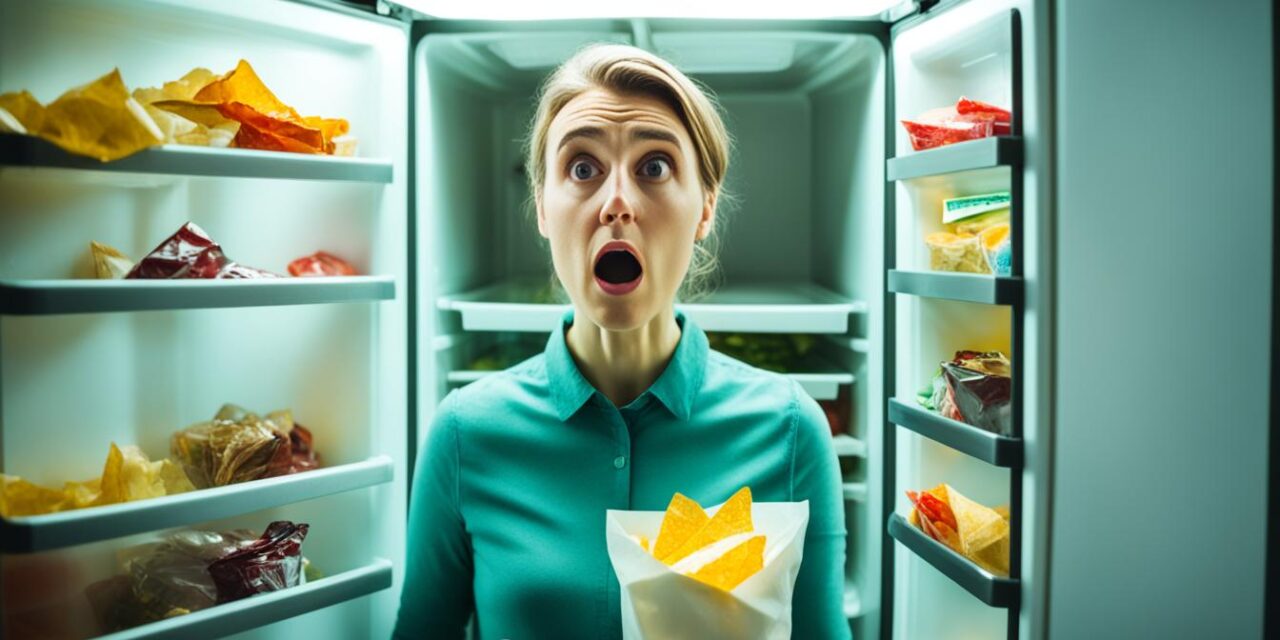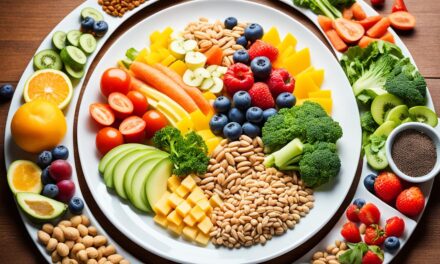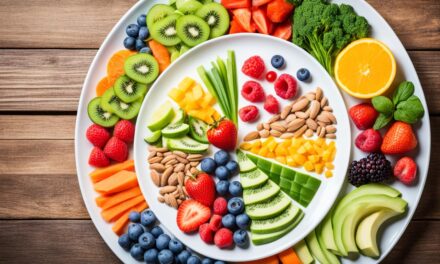Picture this: It’s been a long day at work, and you’re finally home, settling down on the couch with a bag of your favorite snacks. You promised yourself that today would be different, that you would stick to your healthy eating plan. But here you are, mindlessly munching away, completely unaware of the impact this habit is having on your weight loss goals.
While it’s easy to blame the obvious culprits like skipping meals or eating out, there’s one surprising habit that often goes overlooked. And that habit is…late-night snacking.
Yes, that harmless indulgence in front of the TV can actually sabotage your weight loss efforts. But why? Late-night snacking often stems from emotional eating or boredom, and it’s easy to lose track of how much you’re consuming when you’re distracted by your favorite show.
In fact, studies have shown that late-night snacking can lead to overeating, hinder digestion, and contribute to weight gain. And let’s not forget about those dreaded gastrointestinal issues that can arise from eating too close to bedtime.
So if you’re serious about losing weight, it’s time to address this surprising habit and make some changes. In this article, we’ll explore the impact of skipping meals, eating on the go, and other common habits that can hinder your weight loss progress. Get ready to discover healthy weight loss tips and avoid the mistakes that have been derailing your efforts.
Key Takeaways
- Skipping meals can lead to a slower metabolism and an increase in belly fat.
- Eating on the go can result in overeating and not recognizing when you’re full.
- Late-night snacking can contribute to weight gain and gastrointestinal issues.
- Eating out and eating too fast can lead to overeating and unsatisfying meals.
- Making mindful food choices and slowing down can help you achieve your weight loss goals.
The Impact of Skipping Meals
Skipping meals may seem like a quick solution for weight loss, but it can actually do more harm than good. Not only does it slow down your metabolism, but it also leads to poor food choices later in the day.
When you skip meals and let yourself get too hungry, you’re more likely to overeat and make unhealthy choices. Research has shown that skipping meals is directly linked to an increase in belly fat, which poses a risk for various health problems such as heart disease and diabetes.
To understand why skipping meals can be detrimental, let’s delve into the consequences it has on our body and overall well-being.
A Slower Metabolism
Our metabolism plays a crucial role in weight management. When we regularly skip meals, our body goes into starvation mode. It slows down our metabolic rate to conserve energy, making it harder to burn calories efficiently.
Additionally, when we finally eat after skipping a meal, our body tends to store those calories as fat as a protective measure against future food scarcity. This can lead to weight gain and an increase in belly fat.
Poor Food Choices and Overeating
Skipping meals can also negatively impact our food choices and portion control. When we’re extremely hungry, we tend to reach for quick and convenient options that are often high in calories, sugar, and unhealthy fats.
Moreover, when we finally have a meal after skipping one, we’re more likely to eat quickly and consume larger portions. This can easily result in overeating and disrupt the balance between calorie intake and expenditure.
By skipping meals, you’re setting yourself up for a cycle of poor food choices, overeating, and potential weight gain.
Avoiding Health Problems
The increase in belly fat caused by skipping meals can have serious implications for your health. Belly fat is not just a cosmetic concern; it is associated with an elevated risk of heart disease, diabetes, and other health issues.
Research has shown that abdominal fat releases inflammatory substances that can contribute to insulin resistance, high blood pressure, and cholesterol imbalances. These factors significantly increase the risk of developing chronic conditions that can negatively impact your overall well-being.
It’s important to prioritize regular, balanced meals to maintain a healthy weight and reduce the risk of these health problems.
“Skipping meals may seem like a time-saving strategy, but it’s a recipe for weight gain and health issues. Take care of your body by nourishing it with regular, balanced meals.”
Skipping meals is not a sustainable or healthy approach to weight loss. It can lead to a slower metabolism, poor food choices, an increase in belly fat, and a greater risk of developing health problems.
| Impact of Skipping Meals | Consequences |
|---|---|
| Slower Metabolism | Our metabolism slows down to conserve energy, making it harder to burn calories and potentially causing weight gain. |
| Poor Food Choices and Overeating | Skipping meals leads to unhealthy food choices, overeating, and disrupted portion control. |
| Health Problems | Skipping meals contributes to an increase in belly fat, which is associated with a higher risk of heart disease, diabetes, and other health issues. |
It’s crucial to prioritize regular meals, ensuring they are balanced and provide your body with the nutrition it needs for optimal function.
The Pitfalls of Eating on the Go
Eating on the go may seem convenient and time-saving, but it can wreak havoc on your weight loss goals. When you’re constantly on the move, it’s easy to fall into the trap of mindless eating, leading to overeating and not recognizing when you’re actually full. It’s time to put the brakes on this habit and take control of your eating habits!
Distraction and Overeating
When you eat on the go, your attention is divided between multiple tasks, making it difficult to fully focus on your meals. Whether you’re rushing to catch a train or gobbling down a sandwich during a work break, distractions can lead to overeating. Research suggests that distracted eating not only increases calorie intake but also impairs our ability to recognize when we’ve had enough.
“When we eat while distracted, we fail to register the physical and sensory cues that indicate fullness. As a result, we consume more calories than our bodies actually need,” says Dr. Emma Johnson, a registered dietitian.
The Power of Walking and Mindless Eating
Walking while eating might seem like a good way to multitask, but it can actually be a powerful form of distraction. When we’re focused on getting from point A to point B, we’re less likely to pay attention to how much food we’re consuming. This mindless eating can lead to poor portion control and contribute to weight gain.
Recognizing Fullness and Portion Control
One of the challenges of eating on the go is not recognizing when you’re full. Without taking the time to savor your food and eat mindfully, you may continue eating past the point of satiety. This can result in consuming more calories than your body needs and hinder your weight loss progress.
Remember, it’s important to prioritize your health and well-being, even when life gets busy. Instead of rushing through meals, try to find moments of mindfulness and make conscious choices about what and how much you eat.
By being aware of the pitfalls of eating on the go and making small changes to your habits, you can regain control over your eating patterns, improve portion control, and better recognize your body’s fullness cues. Slow down, savor your food, and give yourself the time to nourish both your body and mind.
The Dangers of Late-Night Snacking
We’ve all been there, late at night, craving a snack. Whether it’s due to emotional eating, boredom, or mindless munching, late-night snacking can derail your weight loss goals. It’s important to understand the potential dangers and pitfalls of giving in to those midnight cravings.
First and foremost, it’s crucial to distinguish between true hunger and other factors that may be driving the desire to eat late at night. Often, late-night snacking is more about emotional satisfaction than actual physical hunger. Identifying the root cause of your cravings can help you find healthier alternatives to satisfy those late-night urges.
Another danger of late-night snacking is the tendency to overeat. When we snack too close to bedtime, our bodies often confuse hunger and thirst. This can lead to mindless munching and consuming more calories than we actually need. By being mindful of your body’s signals and opting for a glass of water or herbal tea instead of reaching for a snack, you can avoid overeating and unnecessary calorie intake.
In addition to the potential for overeating, late-night snacking can also contribute to gastrointestinal issues, particularly if you eat less than two to three hours before lying down. This can lead to discomfort, acid reflux, and heartburn. To promote better digestion and minimize the risk of these issues, it’s advisable to avoid late-night snacking and allow at least a couple of hours between your last meal or snack and bedtime.
One effective strategy for managing late-night snacking is to establish an eating window or a designated period of time during the day when you consume your meals and snacks. This approach, often referred to as time-restricted eating, restricts food intake to an 8- to 12-hour period. By implementing this practice, you can help regulate your body’s internal clock and prevent late-night snacking, ultimately supporting your weight loss efforts.
To sum it up, late-night snacking can be problematic for several reasons. It can lead to overeating, contribute to gastrointestinal issues, and hinder your weight loss progress. By identifying the underlying reasons behind your late-night cravings and implementing strategies like time-restricted eating, you can overcome the dangers of late-night snacking and stay on track towards your health and wellness goals.
| Key Points: | Action Steps: |
|---|---|
| 1. Late-night snacking is often driven by emotions, boredom, and mindless eating. | 1. Identify the root cause of your cravings and find healthier alternatives to satisfy them. |
| 2. Late-night snacking can lead to overeating and excessive calorie intake. | 2. Be mindful of your body’s signals and opt for a glass of water or herbal tea instead of snacking. |
| 3. Eating close to bedtime can cause gastrointestinal issues like heartburn. | 3. Avoid eating less than two to three hours before lying down to prevent discomfort. |
| 4. Implement time-restricted eating to establish an eating window and reduce late-night snacking. | 4. Restrict your food intake to an 8- to 12-hour period to regulate your body’s internal clock. |
The Impact of Eating Out and Eating Too Fast
When it comes to weight gain, eating out can be a real culprit. Whether you’re grabbing a quick bite from a fast food joint or enjoying a leisurely meal at a full-service restaurant, the act of dining out can have a significant impact on your food intake.
One of the reasons is that people tend to spend more time eating when dining out, leading to a more leisurely pace. And let’s face it, the longer we spend at the table, the more we tend to indulge ourselves. It’s almost like time stops and the food keeps coming. Before you know it, you’ve consumed more than you planned.
But it’s not just the time spent eating that can lead to weight gain. The speed at which we eat also plays a role. When we eat too quickly, we don’t fully taste and savor our food. We end up missing out on the flavors and textures that would normally satisfy us. As a result, we’re left feeling unsatisfied and wanting more, which can lead to overeating.
So, how can you combat these habits? Slowing down and eating mindfully is key. Take the time to truly experience each bite, savoring the flavors and enjoying the moment. Not only will this help you create lasting food memories, but it will also increase your overall satisfaction. Remember, it’s not just about the quantity of what you eat, but the quality and enjoyment as well.
FAQ
What is the surprising habit that is wrecking my weight loss?
How does skipping meals impact my weight loss?
Why is eating on the go a pitfall for weight loss?
What are the dangers of late-night snacking?
How does eating out and eating too fast impact weight loss?
MORE SOURCES TO READ:
- https://www.cbsnews.com/media/bad-habits-that-could-be-wrecking-your-diet/
- https://www.eatthis.com/weight-loss-lifestyle/
- https://www.eatthis.com/wrecking-belly-fat-loss-goals/
![]()














Recent Comments